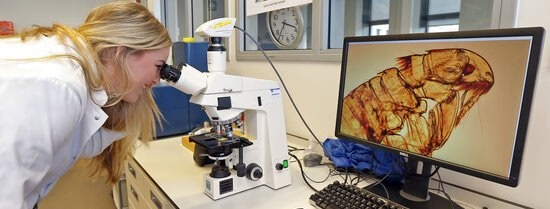Curriculum
The MSc Molecular Medicine programme is a two-year research master’s programme of 120 EC points, representing a total study load of 3,360 hours.
At the start of the programme, during the course Introduction Weeks, you will get to know the programme organizers and course directors, and familiarize yourself with the basic and translational research laboratories within our institute. Several MSc faculty will hold short presentations, to give you a broader view of possible lines of investigation and enable you to make an informed choice for the research projects ahead.
The theory courses of year 1 are designed to help students acquire the basic knowledge and capacities that they need to start the research projects they will be conducting as they proceed through the programme. Most importantly, the courses aim to develop a sense of urgency to stay informed of new developments, and to acquire a life-long learning attitude. Without exception, theory courses are led by scientific MSc faculty.
The laboratory visits and the larger research projects, which together take up almost 18 months of the total two-year study programme, are usually performed within the many basic and/or translational research laboratories that participate in the MSc programme. When working and learning in the lab, students will be continuously guided and supported by the scientific group leader who acts as their direct supervisor.
Access to year 2 of the MSc Molecular Medicine programme
Achieving 40 EC of year 1 gives right of access to the following second year of the MSc Molecular Medicine programme.
Learning objectives
Upon completion of the Research Master programme MSc Molecular Medicine, students have acquired the following skills and knowledge:
Research knowledge and skills
- The student can rephrase and apply basic concepts that are necessary to provide context for the research activities in the domain of Molecular Medicine, including molecular-, cell- and developmental biology and genetics.
- The student can readily and appropriately select and apply relevant research methods and instruments that are used in the field of Molecular Medicine to unravel fundamental biological processes and mechanisms of disease.
- The student is able to find and critically evaluate scientific literature on methods and research in the domain of Molecular Medicine (including, but not necessarily limited to, the fields of molecular-, cell- and developmental biology and genetics), and summarize it to describe the state of the art.
- The student is - under guidance - capable of developing adequate scientific research questions aimed at understanding a molecular mechanism and causal relationships in the field of Molecular Medicine, and can propose appropriate hypothesis-driven experiments that could answer these questions.
- The student has the skills to adequately perform wet-lab biomedical research experiments; to collect, analyze and interpret the data; to correctly use a lab journal; to draw appropriate conclusions and design logical follow-up experiments.
Written and oral communication skills
- The student is capable of writing a scientific research project proposal in the field of Molecular Medicine - in line with the format of an international research proposal, and can identify relevant stakeholders from science, academia, industry and society.
- The student is capable of writing a scientific manuscript based on the results obtained during a research project in the field of Molecular Medicine in line with the format of an international peer-reviewed journal; and can respond with an appropriate rebuttal to feedback from reviewers.
- The student has the skills to effectively communicate scientific research in the field of Molecular Medicine in a well-structured and clear oral scientific presentation, geared towards expert scientific and lay public, and to adequately answer questions from the audience.
Personal and professional skills
- The student acts from sound scientific and ethical values and principles, and follows institutional regulations regarding quality and safety in laboratory practice.
- The student is capable of short- and long- term research project planning, while taking care to preserve mental health, can work largely independently, is flexible and perseveres when results are unexpected or disappointing, and is aware of the need of life-long learning.
- The student can effectively communicate and collaborate with other scientists in the field of Molecular Medicine; is open to constructive feedback and can provide constructive feedback to others; and has a curious, critical, creative, and problem-solving scientific attitude.
Curriculum Overview
| Research Master in Molecular Medicine (Year 1) - 60 EC points - 2025-2027 | ||
|---|---|---|
| Course code | Course | EC |
| MM-PPD1 | Personal and Professional Development Year 1
| 3,0 |
| MM-MBC-A | Molecular Biology of the Cell part A | 4,0 |
| MM-MBC-B | Molecular Biology of the Cell part B | 4,0 |
| MM-GB | Genetics and Bioinformatics | 4,0 |
| MM-DB | Developmental Biology DB - Review Presentation | 4,0 1,0 |
| MM-CRT | Contemporary Research Topics | 4,0 |
| MM-BOD | Biology of Disease | 2,0 |
| MM-RES1 | Lab Research Project Year 1 | 27,0 |
| MM-P1 | Research Progress Presentation - Year 1 | 2,0 |
| MM-RW | Report Writing Research Report | 1,0 4,0 |
| TOTAL EC points Year 1 | 60,0 | |
| Research Master in Molecular Medicine (Year 2) - 60 EC points - 2025-2027 | ||
|---|---|---|
| Course code | Course | EC |
| MM-PPD2 | Personal and Professional Development Year 2 | 1,0 |
| MM-STAT | Statistics | 2,0 |
| MM-CS | Courses and Seminars | 4,0 |
| MM-JC | Journal Clubs | 2,0 |
| MM-PP | Writing a Project Proposal | 2,0 |
| MM-P2 | Research Progress Presentation - Year 2 | 2,0 |
| MM-RES2 | Lab Research Project Year 2 | 39,0 |
| MM-MSTH | Master Thesis Master Thesis Presentation | 6,0 2,0 |
| TOTAL EC points Year 2 | 60,0 | |
